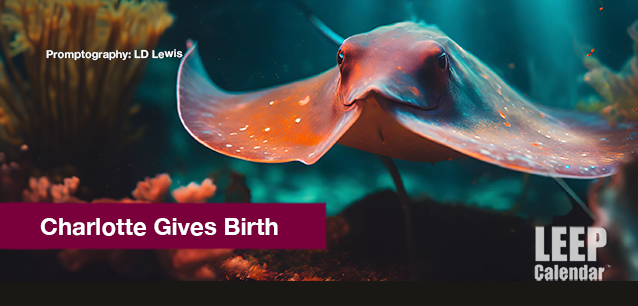 AD
AD
Today is: December 28
Scroll to explore events active on this date.
LEEP INK FEATURES

August? Absolutely!
In August, we live through the Dog Days of Summer. It's hot and often humid, and those who can leave for better climates do. Down south, winter is in full force. August is also known as "the ...

In The Heat of July: July 2025 Events
Is it hot enough (or cold enough if you're below the equator) for you yet? There is actually a day for that! Like every month, I pick a diverse collection of events you may or may not know about. This ...

May Blooms: Events in May 2025
Along with October, May is one of the most densely packed months of the year. It's before the summer humidity and the last whole month of the school year. The weather is warming in t...
About Charlotte Gives Birth
Science & Math
Ends: Mar 10, 2024
DESCRIPTION:
Charlotte Gives Birth—pregnant by immaculate conception.
How does a female stingray living in an aquarium in the middle of the Appalachian Mountains without access to a male end up pregnant?
That is the question.
Charlotte, a burnt orange-colored stingray approximately the size of a giant Frisbee, has become pregnant without contact with a male of her species for at least eight years. Her natural habitat is the coast of Southern California. However, her home has been the Aquarium and Shark Lab on Main Street in downtown Hendersonville for a decade.
Brenda Ramer, the facility's executive director and leader of the educational nonprofit Team ECCO, which operates the aquarium, announced the impending arrival of Charlotte's pups in late February or early March. Initially, her caretakers believed her plump posture evolved due to overfeeding. The gestating mother sported a noticeable lump on her back. An ultrasound revealed the stingray's pregnancy, leaving the staff scratching their head.
Parthenogenesis explains Charlotte's condition. It is a form of asexual reproduction where offspring develop from unfertilized eggs, eliminating the need for male genetic contribution. Parthenogenesis involves the fusion of a female's egg with a polar body, a cell produced during egg creation but typically unused, triggering embryo development. This process isn't fully understood, underscoring nature's incredible adaptability and resilience.
While rare, parthenogenesis has been observed across various species, including insects, fish, amphibians, birds, and reptiles. It does not occur in mammals. Kady Lyons, a research scientist at the Georgia Aquarium in Atlanta, noted that Charlotte's case is unique for round stingrays.
Charlotte's story has captivated the local community and scientists worldwide, providing a valuable learning opportunity on the wonders of marine life and the complexities of biological reproduction.
VIDEOS
SUPPORTING DOCUMENTS
Currently, this event does not have supporting documents.
ADDITIONAL IMAGES
Currently, this event does not have supporting images.
Where would you like to go now?
 AD
AD


/footer-logo.svg)
